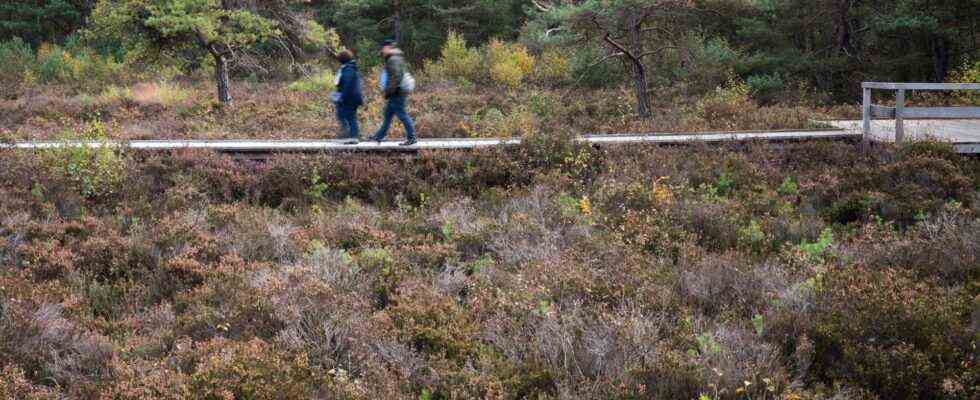Status: 20.10.2021 8:25 p.m.
A good six percent of CO2 emissions in Germany come from drained peatland. The federal and state governments have now signed an agreement to better protect the moors. But actually more was planned, which is why there is now criticism.
The federal and state governments want to preserve and rewet peatlands better in the future so that they can make a greater contribution to more climate protection. Federal Environment Minister Svenja Schulze and Federal Agriculture Minister Julia Klöckner signed an agreement on this together with colleagues from the federal states. According to this, the greenhouse gas emissions caused by bog soils should decrease by five million tons annually by 2030.
“After centuries of losing moors, we are now entering the decade of committed reconstruction,” said Environment Minister Schulze. She pointed out that peatlands store carbon and mitigate the effects of heavy rain, floods, drought or heat. Protecting them is “good for the climate,” said the SPD politician.
Agriculture Minister Klöckner from the CDU said: “With this agreement, we are working with the federal states to achieve enormous savings in emissions. We are relying on regionally adapted solutions in close collaboration with the people in the moor regions.”
53 million tons of CO2 from drained peat soils
The federal-state agreement provides, among other things, not to approve any new applications for the mining of peat, since peat binds large amounts of carbon. The federal government is providing around 330 million euros by 2025 for measures to rewet peat soils, for model projects and for measures to reduce the use of peat. Federal states and municipalities should decide together with farmers how the renaturation will be organized on site.
According to the ministries, around 53 million tons of CO2 emissions recently came from drained peatland. That corresponds to 6.7 percent of the total greenhouse gas emissions in Germany. Peatland makes up around eight percent of the agriculturally used area nationwide.
Criticism from the WWF – praise from the farmers’ association
Criticism of the federal-state agreement came from the nature conservation organization WWF Germany, among others. Johann Rathke, WWF coordinator for agricultural and land use policy, said the grand coalition had not kept its promise to adopt a peatland protection strategy coordinated within the federal government. A federal-state target agreement “does not replace the urgently needed strategy”. In the next legislative period, peatland protection must play a central role, said Rathke. “Not just in the form of confessions, but in action.”
The SPD-led Federal Environment Ministry had not been able to agree on a binding strategy with the CDU-led Ministry of Agriculture in the legislature that was coming to an end. The Federal Environment Ministry stated that the originally planned cabinet resolution “unfortunately failed due to the resistance of the Federal Ministry of Agriculture and Food (BMEL)”. It was therefore not possible to adopt a strategy that would be binding for the entire federal government. The Ministry of the Environment therefore decided in September to adopt a peatland protection strategy of the Ministry of the Environment with “suggestions from other departments”.
A spokeswoman for the Federal Ministry of Agriculture had previously emphasized that the federal-state agreement reached even went “beyond a few points” that had previously been “discussed but not passed” in the departmental vote.
Mecklenburg-Western Pomerania’s Environment and Agriculture Minister Till Backhaus sees it a little differently. “I could have imagined more ambitious goals here,” said the SPD politician, referring to the government’s efforts to emit only as many greenhouse gases by 2045 as can be bound again. But it is “important that we come to a coordinated approach between the federal government and the states,” said Backhaus.
Farmers’ Association welcomes agreement
The German Farmers’ Association expressed its satisfaction with the federal-state agreement. “The federal-state target agreement recognizes the explosiveness of the topic and the need for an amicable solution with the affected citizens, landowners and farmers,” wrote the association in a statement. The planned large-scale rewetting of bog sites could only “be tackled in cooperation with the people in the rural areas concerned, and in particular with the farms,” it said.
It is about more than a million hectares of agricultural land, farmers and landowners should not be “creeping out of use and expropriated,” according to the farmers’ association. “Only voluntary and consensual solutions may be implemented.”

